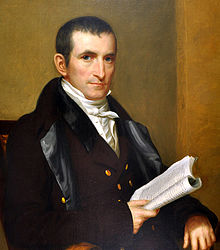
Summary
Elijah Brush (May 10, 1773 – December 14, 1813) was a lawyer and politician from Detroit, Michigan.
Elijah Brush | |
|---|---|
 | |
| 2nd Mayor of Detroit, first charter | |
| In office 1806–1806 | |
| Preceded by | Solomon Sibley |
| Succeeded by | None; reincorporated |
| Personal details | |
| Born | May 10, 1773 Bennington, Vermont |
| Died | December 14, 1813 (aged 40) Detroit, Michigan |
| Spouse |
Adelaide Askin
(m. 1802–1813) |
| Relations | John Askin (father-in-law) |
| Parent(s) | Nathaniel Brush Samantha Parker Brush |
| Alma mater | Dartmouth College |
| Profession | Lawyer |
Early life edit
Elijah Brush was born in Bennington, Vermont in 1773, the son of Colonel Nathaniel Brush and Samantha Parker (d. 1789).[1] Brush graduated from Dartmouth College and came to Detroit in 1798.[2]
Career edit
Following Detroit's hand-over to American control, John Askin, a British subject, moved across the Detroit River to Canada, leaving behind his farm, "Private Claim #1," which was immediately adjacent to Detroit.[1]
Public service edit
Elijah Brush was elected a trustee in 1803, appointed Lieutenant Colonel of the Territorial Militia in 1805, and appointed as mayor of the town of Detroit after Solomon Sibley's resignation in 1806.[2] Brush also served as Treasurer of the Michigan Territory from 1806 to 1813, and from 1811 to 1814 served as United States Attorney.[3]
In 1807, Brush was the counsel in the first case to test the right to hold slaves in Michigan, Denison v. Tucker.[4]
During the War of 1812, British forces captured Detroit and Elijah Brush and other militia officers were taken prisoner.[2] He was shipped to Toronto, but his brother-in-law, a British officer, procured his release, and Brush returned to Detroit in late 1813[5] when American troops retook the city.[2]
Personal life edit
In 1802, Brush married Adelaide Askin (1783–1859),[1] daughter of John Askin and sister of John Askin, both prominent fur traders.[2] The couple had three sons and a daughter[3] who survived their father:[1]
- Edmund Askin Brush (1802–1877), who married Elizabeth Cass Hunt (1825–1913).[6]
- Charles Andrew Brush (1804–1807), who died young.[6]
- Charles Reuben Brush (1807–1849), who married Jane Cameron Forsyth (1809–1856).[7]
- John Alfred Brush (1811/5–1870), a doctor.[6]
- Archange "Semanthe" Brush (1813–1842), who married Charles Meredith.[6]
Elijah and Adelaide moved onto Askin's farm, and in 1806 the Brushes purchased it for $6000 and it eventually became known as the Brush Farm.[1] Brush, a careful administrator, increased the value of the farm and made his heirs wealthy.[2] In the 1850s, Edmund Brush began developing sections of the property into the fashionable Brush Park; the streets Edmund, Alfred, Adelaide, and Brush were named after members of the family.[8]
He died on December 14, 1813, shortly after the Americans retook Detroit.[2][5]
References edit
- ^ a b c d e Judy Jacobson (2002), Detroit River Connections: Historical and Biographical Sketches of the Eastern Great Lakes Border Region, Genealogical Publishing Com, pp. 58–63, ISBN 0-8063-4510-1
- ^ a b c d e f g The government of the city of Detroit and Wayne County, Michigan: 1701 to 1907, historical and biographical, 1907, pp. 26–27, ISBN 9780598455529
- ^ a b "Elijah Brush". History of Detroit.com. Retrieved September 7, 2010.
- ^ Stephen D. Bingham (1888), Early history of Michigan: with biographies of state officers, members of Congress, judges and legislators, Thorp & Godfrey, state printers, p. 134
- ^ a b "Elijah Brush". Elmwood Cemetery. Retrieved September 7, 2010.
- ^ a b c d Burton, Clarence Monroe. The City of Detroit, 1701 -1922, Volume 4. p. 137. ISBN 9783849678043. Retrieved March 7, 2018.
- ^ Averill, Patricia (2006). Cameron: Cameron: Family, Technology and Religion in a Rust Belt Town as Seen by Averills, Nasons, Mccormicks and Others Who Passed Through. Xlibris Corporation. p. 636. ISBN 9781477177556. Retrieved March 7, 2018.
- ^ Ren Farley. "Brush Park Historic District/Woodward East Historic District". Detroit1701.org. Retrieved September 7, 2010.
External links edit
- Elijah Brush at Find a Grave


